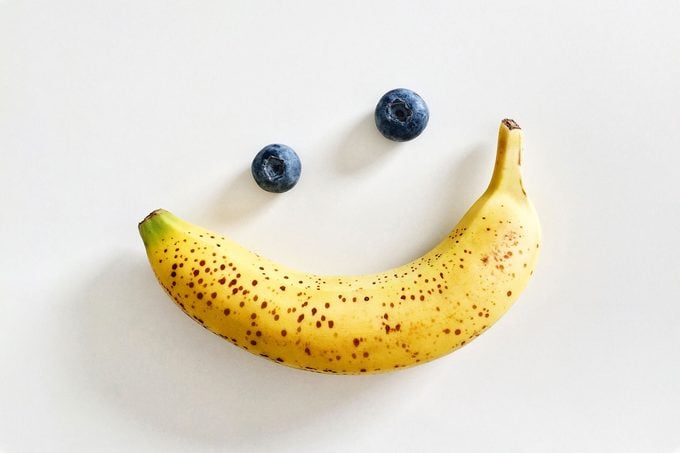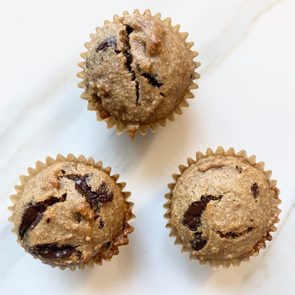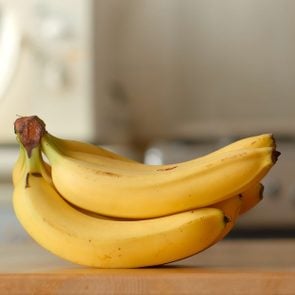The Banana Health Benefit You for Sure Weren’t Aware Of, Dietitians Reveal
Updated: Jun. 17, 2024
They're one of the easiest (and yummiest) fruits to grab on the go. You probably knew bananas were a good source of potassium—now, here's another benefit from bananas that's likely to make your tummy very happy.
Why bananas are the best fruit
Bananas: They might seem basic a far as fruits go, but slicing one into your cereal or blending one into your smoothie may be doing even more good for your body than you knew.
Research tells us that the common-seeming banana provides an extraordinary number of nutritional benefits:
- Bananas contain antioxidants that may boost immunity and reduce the risk of chronic disease, according to research published in Food Chemistry.
- They also promote sleep with tryptophan and melatonin, according to the Journal of Medical and Allied Sciences.
- Bananas have fiber that slows digestion to help you feel fuller for longer, according to the American Journal of Clinical Nutrition.
Now, a recent study adds another banana health benefit to the bunch: Great gut health.
Why are bananas good for gut health?
In 2021, researchers from Australia reviewed more than 50 prior studies to gain a better understanding of how our gut (or more clinically known as the gastrointestinal system) affects our general health. Their review, published in the Journal of Gastroenterology and Hepatology, reveals the importance of a balanced microbiome. “The gut microbiome are the bacteria that live in our intestines,” says Dana Ellis Hunnes, PhD, a senior dietitian at UCLA Medical Center and author of the January 2022 book, Recipe For Survival. “It’s thought that the more overall diversity there is in our gut, the healthier our gut microbiome is.”
You’ve probably heard of probiotics—but what are they? Probiotics are live bacteria that are found in fermented foods and supplements. They’re the “good” bacteria within this microbiome balance. (And if you’re looking to add more to your diet, check out which 12 probiotic brands nutritionists trust the most.)
But you can’t just consume probiotics and call it a day. These healthy bacteria need nourishment, too—and that’s where foods like bananas come in. “Bananas are very high in a type of fiber called soluble fiber, which is a type of prebiotic,” says Sally Twellman, a registered dietitian at Heading Health. Prebiotics are the food that these good gut bacteria use to perform a whole host of healthy activities, playing important roles in functions like your digestion and immune system regulation.
Why is gut health important?
“Our gastrointestinal (GI) tract is actually the basis for all our health systems,” Twellman explains. And if our gut microbiome’s good bacteria don’t get fed with prebiotics, they’ll die off, creating a gut bacteria imbalance known as dysbiosis.
Another review published in the International Journal of Molecular Sciences illustrated the toll of this imbalance. Research has shown that dysbiosis may contribute to chronic conditions such as inflammatory bowel disease (IBS), obesity, diabetes, and cancer.
Twellman says part of the problem is that without healthy bacteria in our gut, cell integrity all along the gastrointestinal tract suffers. And when these cells’ structures weaken, it can trigger an unnecessary immune system reaction. “This is one of the things that can cause chronic inflammation,” she explains.
Inflammation is an important immune system response to protect us from infection or injury—so in that regard, it’s a net positive. But problems can develop when your immune system starts overreacting to non-threats (like the weakened gastrointestinal tract cells, for example), causing low-grade, constant inflammation.
Scientists continue to study the risks associated with chronic bodily inflammation. Currently, research published in the journal Nature Medicine suggests it’s a leading cause of disability and mortality worldwide, playing a role in conditions like heart disease, kidney disease, liver disease, autoimmune disorders like lupus, and neurodegenerative disorders like Alzheimer’s. (Some good news is that you could consider cutting down on a few of these foods that cause inflammation.)

Bananas as brain food
Feeding your gut microbiome may promote better mental health, as well. Emily Clairmont, a registered dietitian with the University of Vermont Medical Center, says that there is a growing body of research revealing close, two-way communication between our brain and our gut. “Researchers are suggesting that changes to the gut microbiome can modify communication to the brain,” she says. And that change can alter how well our brain and gut transmit information.
Research published in the journal Clinics and Practice suggests that inflammation may play a role in this relationship. The study links dysbiosis-related inflammation with mental illnesses like anxiety and depression. So, maintaining a balanced microbiome in the gut could promote your mental health and overall wellness.
But, says Clairmont, it’s still a bit of a chicken-or-egg scenario. With irritable bowel syndrome as just one example of how our minds and gut health may be related, this dietitian says: “We have yet to answer the question of which came first: The stress or the IBS. Perhaps it was changes to gut bacteria that resulted in changes to neuronal pathways and [feeling stress]—or perhaps it was the experience of stress that resulted in changes to the gut microbiome.” (To take the weight off from some of that stress, check out 10 Easy Self-Care Swaps to Make in 2022.)
Are bananas a diuretic?
Another benefit bananas have on your belly? It’s said they can help curb bloating.
By easing inflammation, the fruit’s soluble, prebiotic fiber can help relieve constipation—a common culprit of uncomfortable bloating. A banana’s high potassium levels also help your kidneys flush out excess water and salt from your body, encouraging a diuretic effect that reduces water retention and bloat.
But this effect goes beyond the aesthetic.
“Potassium also helps your kidneys maintain good blood pressure,” Twellman says. That’s because too much water and salt in our body (which can happen when our kidneys aren’t working at their best) strains our artery walls. Over time, this can cause them to thicken and narrow, raising our blood pressure and risk for heart disease.
For gut, heart, and mental health all in one package, here are 8 genius ways to work bananas into your daily diet.
How to have great gut health
As a prebiotic fiber, bananas feed your gut’s good bacteria and promote healthy digestion to help you look and feel your best.
Still, there’s more to maintaining a healthy microbiome than loading up on banana chocolate smoothies or dietitian-approved banana bread. Our gut bacteria need a balanced diet, too, so the experts say to make sure you’re eating an assortment of whole, high-fiber foods.
In addition to bananas, prebiotics are found naturally in many vegetables, fruits, and whole grains, Clairmont says. Her list of these includes onions, garlic, apples, asparagus, dandelion greens, and Jerusalem artichokes.
Hunnes adds that being mindful of your antibiotic intake can be good for your gut health, too. That’s because antibiotics “can often lead to untoward side effects such as diarrhea or constipation, gas, cramping, and nausea,” she explains. “Limiting the use of antibiotics to only when they are prescribed and needed is a good idea,” she says. That’s because while antibiotics are designed to kill bad bacteria, they often wipe out the healthy bacteria, too, disrupting your microbiome balance. (Learn more about why you should take probiotics after antibiotics.)
What other foods are associated with poor gut health? Ultra-processed foods—think fast foods or packaged foods—are associated with lower probiotic diversity, Hunnes says. So limiting these processed items, which are often devoid of fiber and nutrients anyway, can be another step toward better health in your gut and the rest of your body.
In fact, the Gastroenterology and Hepatology research reinforces that dietary patterns early in life—particularly, exposure to ultra-processed foods in childhood and adolescence—can influence our gut health as adults. This relationship includes our risk for developing conditions like irritable bowel syndrome or colorectal cancer, according to the researchers.
Feeling inspired to fortify your microbiome for long-term health? Here are 6 more prebiotic foods to include in your diet alongside bananas.





















